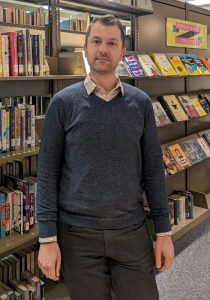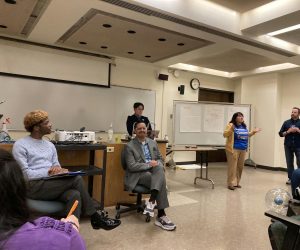It’s a Small Town After All!
September 6, 2012
Northeastern Illinois University (NEIU) English Professor Dr. Ryan Poll’s book, Main Street and Empire: The Fictional Small Town in the Age of Globalization attempts to showcase the American small town as not just a geographic location, but an ideological fiction that exists in forms as varied as the books of Sinclair Lewis, Thornton Wilder’s Our Town, and Walt Disney’s Main Street, USA. The book of literary criticism, published by Rutgers University Press, is his first published book. Dr. Poll suggests that the fictional small town provides an ideological framework for the expansion of American cultural and economic practices into the 21st century. In a recent interview with the Independent, Poll discusses this notion.
What motivated the book?
I’ve always been really interested in the intersection of literature, culture, and politics. I think literature is at its most ideological when it functions as this contained, autonomous space, where we pretend literature doesn’t exist as part of the wider world. I was reading about Ronald Reagan, just being angry about what he was doing, even though I was too young to appreciate it when he was in office. I began thinking about how important Dixon, Illinois was to his campaigns, and for a series of speeches he gave where he was lambasting welfare, saying, “Dixon doesn’t need welfare.” This idea of the small town becomes a model of the nation. Knowing Illinois, I knew Dixon was more an industrial city than a small town. It made me think: why is the small town so important? Then, going back politically, I found that every presidential candidate since Lincoln has used the image of the small town to appeal to the American people. I’m like, “this was a total fiction.” So I started at this political moment, and because I recognized it as fiction, I wondered if literature helped create or contribute to this ideological fiction. And in fact I think it does. It shows the power of fiction in structuring social and political imagination.
Could you go over some of the ways our capitalistic way of life can fall within the definition of an empire?
I’m very much interested in this linking that seems counterintuitive, that Main St. seems very distant from thinking of the U.S. as an empire. I’m sort of following Edward Said, among many other critics of empire. Said said, in Culture and Imperialism, that he’s always shocked by the United States, as opposed to European empires such as France, Spain, and England where there was this celebration of empire, the U.S. Empire exists with this public denial: “Of course we’re not an empire! We may be a global force, but we’re a benevolent force.” The central national image of the small town helps to conceal that we are a global power by imagining us as a contained island form that exists separately from the rest of the world. Sarah Palin is an easy example, but when Barack Obama took office he had a White House to Main St. tour. It’s not like “I’m going to Pennsylvania or Southern Illinois,” it’s “I’m going to Main St.” It’s all these subtle ways the [small town] imaginary is perpetuated.
The small town system doesn’t just obscure the machinations of Capitalism; it also helps to replicate them on a global scale.
I’m thinking about how the small town as a frame becomes a celebration of consumption, ideologically divorced from production and distribution. Walt Disney’s Main Street, U.S.A. became a model for consumption, as a lot of cultural geographers have pointed out. It became the model for the construction of shopping malls; this contained space where we’re able to shop and not think about where commodities come from. It’s a narrative framed by this ideological small town.
Being able to consume limitlessly without having to think about where these commodities come from- is that what you mean when you talk about the importance of “innocence” in constructing the small town and, in a larger sense, constructing our national image?
Yes. That’s really the heart of creating the ideological small town; where we can think of not being responsible or even a part of a globalizing world. I think that’s a central attribute of the U.S. Empire: that we’re this innocent, benevolent force whereby you can’t ask questions about consequences or social relations beyond U.S. borders.
A critical perspective you suggest as an alternative is “critical regionalism.” What is critical regionalism and how can it help us look beyond Main St. or to see Main St. better?
When literature was created as a discipline, the organizing principle was the nation, so you read every literature as an expression of the nation. You still see that on campus: American Literature X to Y, English Literature, etc. Everything’s organized by the nation. I think what’s really important is to start thinking about spatial relations: alternative ways to organize literature, to return it to material spaces, and what a difference that would make. Critical regionalism moves us away from the nation as a paradigm and it makes us more creative and critical about how we group texts together. In my next project, Narrating Oil, rather than read by the nation, it’s reading along what I call the oil pipelines- from spaces that consume the most oil, to spaces where oil is produced. It’s a way to read Jack Kerouac’s On The Road along with novels being produced in the 1950’s and ‘60’s from Saudi Arabia, such as Cities of Salt. We’ve done a good job of thinking about how literature has developed over history, but we’ve forgotten about our spatial imagination.







